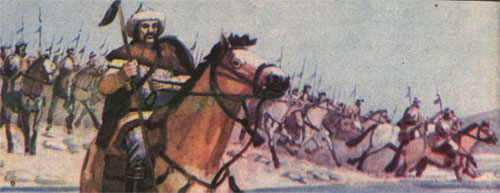The conference, Roman Amphitheatres And Spectacula: A 21st Century Perspective is organised by English Heritage and Chester City Council and will be held at Chester’s Grosvenor Museum on February 17-18 2007.
Speakers from around the world have been lined up to showcase new research and stimulate debate about amphitheatre studies. Details of new amphitheatre sites found across the Roman world will be revealed and the organisation of the spectacles, like gladiatorial combat, will also be examined.
For more details on the conference see their website and visit the Chester Amphitheatre project site for more details
Subsection of Roman Times:
A weblog of links to and abstracts from academic presentations on the Roman Empire
Sunday, January 14, 2007
Saturday, January 13, 2007
Origins of the Huns debated

This week I started listening to a book about Attila the Hun and the impact of the Huns on the decline of the Roman Empire. As most of my study has focused on the Republican Period, I am still relatively uninformed about the late western Imperial Period except what I have gleaned from watching the TV miniseries "Attila" and reading a well-informed novel by a retired Canadian history professor, Boris Raymond, "The Twelfth Vulture of Romulus".
Therefore I was unfamiliar with theories about the origins of the Huns and found John Man's assertion that the Huns were remnants of the defeated XiongNu peoples of the area that would later be populated by the Mongols. Despite their "Chinese" sounding name, the XiongNu are
"...thought to have descended from various Turkic peoples known as Xianyun, Xunyu and Hongyu, yet all the knowledge we have come from Chinese sources written centuries later. However, as time passed, the name Xiongnu was applied to the Xiongnu’s subjects too, including Turkics, Mongolics, Tokharians, Iranics, etc.
The exact foundation of the Xiongnu Empire is unknown, but the earliest Chinese records about them date back to 4th-3rd centuries BC." - The XiongNu, All Empires
One of their greatest leaders was a king named Modu:
"Modu (Maodun in Modern Chinese), son of Touman, was his father's heir, but he was sent to exile to the Yuezhi, a nomadic Tokharian people in Gansu. Touman finally marched on the Yuezhi (this was a fake invasion, because Touman's new wife had wanted to kill Modu) but Modu was able to escape. Touman allowed Modu to return, and gave him a unit of 10,000 cavalries under his command. Modu trained his men very strictly, and during a hunt, he "accidently" shot his father with an arrow in 209 BC. "
Man related a much more interesting version of the above incident however. He said Modu trained his cavalry to shoot wherever he, himself, released an arrow, without hesitation. He began their training with innocent hunting expeditions but one day he shot at his favorite horse and the horse was impaled by a shower of arrows. Next day, he loosed an arrow towards his favorite wife. Again, she was pierced by a following volley of arrows. Finally, he went hunting with his father, the king, and loosed an arrow towards him. The king was pinioned by so many arrows there wasn't room for another shaft in his body.
I also found it ironic that Roman mercernaries were hired by the last western Xiongnu king to try, unsuccessfully, to protect him from the conquering Han.Decline and Collapse of the Xiongnu Empire:"After Modu’s death, he was succeded by Jiyu (also known Laoshang Jiyu Chanyu), who ruled between 174 BC and 160 BC. During his reign, the Xiongnu kept their strentgh, Jiyu managed to penetrate deep into Central China near Chang'an (the Han capital) in 166 but he married with a Han princess and opened the Xiongnu territories to Han spies disguised as officers and diplomats. These spies provoked the subject peoples to revolt against their masters, which later resulted in the break up of the vast Xiongnu Empire. One of them, Zhang Qian, was famous from his expedition to the Yuezhi, although he was captured by the Xiongnu and was forced to stay as a captive for ten years. When he reached Chang'an in 126, he brought important information about the peoples and towns of the areas he had visited. These datas later helped the Chinese to expand into Central Asia easier.
After Jiyu's death, the successor rulers couldn't stop the decline of the Xiongnu Empire. The Xiongnu raids into China were stopped by the Han ruler Han Jingdi; Han Wudi reformed his army in Xiongnu style and between 127 and 117 BC, the Xiongnu lost Tarim to Han Wudi; during the reign of Judihou Chanyu, Tian Shan, Jungaria and Turfan were conquered by the Han and eventually, the Xiongnu lost the control of the Silk Road in 60 BC. In 85 BC, the Wuhuan and the Dingling rebelled, defeating the weakened Xiongnu. After this rebellion, the victorious Dingling split into Western and Northern Dingling. Huhanye, a half-Chinese Xiongnu prince, entered Han protectorate in 58 BC but his brother Luanti Hutuwusi revolted against him and he declared his independence in the same year wih the title Zhizhi Chanyu. This event caused the Xiongnu Empire to split into two separate empires in 55 BC; the Eastern and Western Xiongnu, each one ruled by a member of the Xiongnu Imperial family.
In 54 BC, the Eastern Xiongnu withdrew to Ordos while the Western Xiongnu migrated to Soghdiana in Transoxiana, where they set up a new empire near the River Talas. Under Zhizhi Chanyu's rule, starting from 51 BC, the Western Xiongnu conquered Wusun, Western Dingling, Jiankun (Qirghiz) and vassalised the Kingdom of Kangguo (Samarkand). In 41 BC, Zhizhi Chanyu built a fortified capital in the valley of Talas. However, the Han attacked Zhizhi Chanyu in 36 BC, destroyed his capital and killed him. Thus, the Western Xiongnu Empire came to an end. It's been claimed that there were Roman mercenaries in Zhizhi Chanyu's army during the siege of his capital." - The XiongNu, All Empires
Subscribe to:
Comments (Atom)